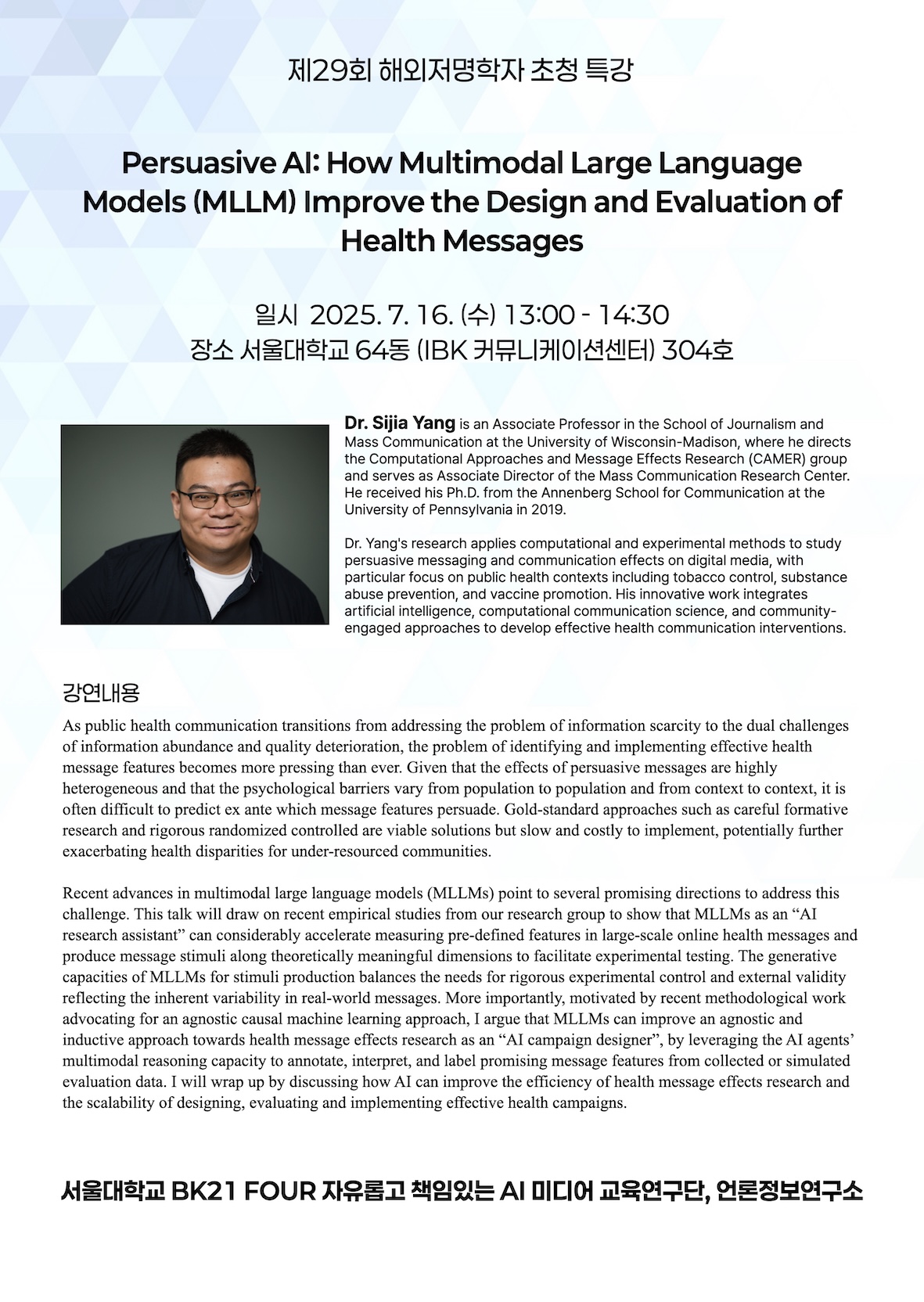
강연 제목 - Persuasive AI: How Multimodal Large Language Models (MLLM) Improve the Design and Evaluation of Health Messages
일시 - 7월 16일 (수) 13:00-14:30
장소 - 서울대학교 64동 (IBK커뮤니케이션센터) 304호
강연자 - Sijia Yang 교수님 (University of Wisconsin-Madison)
강연 내용 - As public health communication transitions from addressing the problem of information scarcity to the dual challenges of information abundance and quality deterioration, the problem of identifying and implementing effective health message features becomes more pressing than ever. Given that the effects of persuasive messages are highly heterogeneous and that the psychological barriers vary from population to population and from context to context, it is often difficult to predict ex ante which message features persuade. Gold-standard approaches such as careful formative research and rigorous randomized controlled are viable solutions but slow and costly to implement, potentially further exacerbating health disparities for under-resourced communities.
Recent advances in multimodal large language models (MLLMs) point to several promising directions to address this challenge. This talk will draw on recent empirical studies from our research group to show that MLLMs as an “AI research assistant” can considerably accelerate measuring pre-defined features in large-scale online health messages and produce message stimuli along theoretically meaningful dimensions to facilitate experimental testing. The generative capacities of MLLMs for stimuli production balances the needs for rigorous experimental control and external validity reflecting the inherent variability in real-world messages. More importantly, motivated by recent methodological work advocating for an agnostic causal machine learning approach, I argue that MLLMs can improve an agnostic and inductive approach towards health message effects research as an “AI campaign designer”, by leveraging the AI agents’ multimodal reasoning capacity to annotate, interpret, and label promising message features from collected or simulated evaluation data. I will wrap up by discussing how AI can improve the efficiency of health message effects research and the scalability of designing, evaluating and implementing effective health campaigns.
강연자 소개 - Dr. Sijia Yang is an Associate Professor in the School of Journalism and Mass Communication at the University of Wisconsin-Madison, where he directs the Computational Approaches and Message Effects Research (CAMER) group and serves as Associate Director of the Mass Communication Research Center. He received his Ph.D. from the Annenberg School for Communication at the University of Pennsylvania in 2019.
Dr. Yang's research applies computational and experimental methods to study persuasive messaging and communication effects on digital media, with particular focus on public health contexts including tobacco control, substance abuse prevention, and vaccine promotion. His innovative work integrates artificial intelligence, computational communication science, and community-engaged approaches to develop effective health communication interventions. His research has been published in top-tier communication journals such as Journal of Communication, Human Communication Research, and Journal of Computer-Mediated Communication, as well as leading public health and medical journals including Social Science & Medicine, Preventive Medicine, Drug and Alcohol Dependence, Journal of Medical Internet Research, and Journal of the American Medical Informatics Association.
As principal investigator or co-investigator on several grants totaling over $9 million from organizations including NSF, CDC, and the Knight Foundation, Dr. Yang's work has received significant recognition, including a Top Poster Award from the Association for Education in Journalism and Mass Communication, the Abby Prestin Dissertation Award, and the Top Paper Award from the Health Communication Division of ICA. He has received the Exceptional Service Award and the Terry Hynes Innovative Leadership Award from UW-Madison for his service to the department, university, and local communities.

